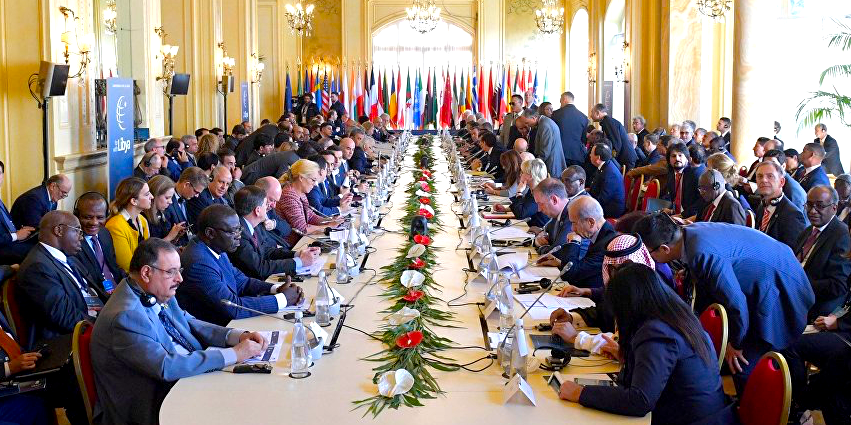
On November 12 and 13, 2018, the Italian government hosted the Conference for Libya in Palermo. A high-level event that was strongly pushed by Italy, it aimed to find common ground among internal and external actors for solving the country’s political conflict. And while the Conference has, from a political standpoint, drawn both criticism and praise, from a diplomatic perspective it has been welcomed as a necessary and important step in the right direction, even if a small one.
The current Libyan conflict erupted in 2014 and has continued to simmer since, with regular outbursts of violence and only occasional and short-lived diplomatic breakthroughs. During this time, internal actors—including Libyan militia and political leaders—have created, disbanded and re-created alliances, while external actors have continued to interfere in the conflict. A general lack of coordination between the parties has quickly given rise to rivalries, with the effect of undermining the negotiation efforts led by the UN and leading some analysts to openly warn about the break-up of Libya.
The Palermo Conference can therefore be seen as an effort to both reset and galvanize the negotiations, and one of its most positive, if under-reported, aspects was, in fact, the ambition of its agenda. The Conference successfully brought together most of the Libyan parties to the crisis—including the leader of the Government of National Accord, Fayez Al Serraj, the Tobruk Parliament, Aguila Saleh, and the Libyan National Army, Khalifa Haftar—and external actors, including France, Italy, the US, Russia as well as Egypt, Turkey and Qatar. Notably, the Conference also included a session on economic issues, which have not been given much prominence in diplomatic efforts to date.
Indeed, most analysts see the launch of a new diplomatic effort to end the Libyan crisis the main success of the Conference. Importantly, this appears to be a coordinated effort, as Palermo has allowed several actors to start resolving their differences, including Italy and France (France was not involved in the event’s preparations, but did send its Foreign Minister, who took part to all the main meetings). Just as importantly, on the Italian side, the Conference marked a re-balancing of the responsibility for the Libya portfolio between the Ministry of Interior and the Ministry for Foreign Affairs. Finally, all the parties whose presence was important to the outcome of the conference were present. Such level of inclusivity had not been achieved since the days of the negotiations that brought to the signing of the Skhirat Agreement (in December 2015), and is as such as a positive sign. As the Brookings Institute reported:
“Like most peace conferences, Palermo wasn’t a watershed for the stabilization of Libya. Nevertheless, there were a few steps forward. Arguably, Italy succeeded in promoting its bottom-up approach, encouraging dialogue between Libyan actors to agree on the road map for stabilization, unified institutions, and clear electoral legislation as preliminary conditions for any election to be held.”
Government proclamations aside, the success of the Palermo Conference was also quite limited. In particular, the event found very little common ground between the participating delegations, Libyan and international alike. The main results—an agreement by participants to take part to a second international conference to be held in January 2019 in Libya, and to hold elections later in the year—are quite meager. This is not necessarily a sign of failure, but it certainly is an indication of just how long the road to finding a sustainable solution may still be. There are also doubts about whether the international community can remain united, a challenge that became clear when the Turkish delegation left the Conference to protest its exclusion from a key meeting between Al Serraj and Haftar.
Overall, when measuring the successes of the Palermo Conference against its limitations, and even acknowledging the fact that this should be seen only as the start of a new negotiation phase, the conclusion is that not enough has yet been done to change the prospects for peace and stability in Libya. The question, then, is how to built on such a foundation.
To begin with, the dialogue process has to be more inclusive. Some Libyan actors did not take part to the Palermo Conference, including many representatives of local communities and civil society whose role is central to sustainable peace. Civil actors are routinely engaged in conflict resolution across Libya, and often enjoy more legitimacy than political leaders. Their inclusion would also ensure that the negotiation agenda addresses issues that resonate among Libyans, like economic recovery and the new constitution.
Secondly, the Palermo Conference has confirmed the mandate of the UN Special Envoy, Ghassam Salame. But while this is positive, it is important to point out that the UN has only as much power as member states allow it to have. Here, the focus on elections is troubling, as it feels like a repetition of what has already been done, with elections in 2012 and 2014, which eventually failed to foster stability. Instead, a wider remit, including for example civil affairs and transitional justice, would give the UN greater leverage in the negotiations.
Lastly, external actors have to remain united and minimize the incentives of Libyan factions to disengage. The role of Italy on this aspect is necessary, but also not sufficient. For the Italian government, promoting stability in Libya through an inclusive process has to remain a national priority, as does working with France. As former Prime Minister Romano Prodi points out, “a coordinated strategy between France and Italy is a necessary condition for having a common European policy” on Libya. It is also a necessary condition to keep other actors in check, and in particular those who might be tempted to act as spoilers and test, as Haftar himself did in Palermo, Europe’s resolve to get the process right this time around.






























